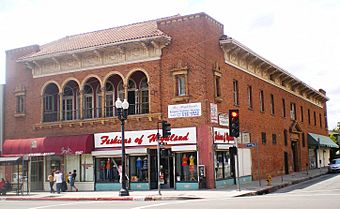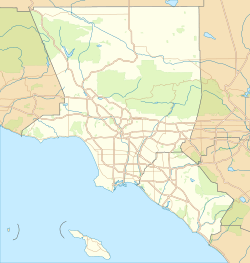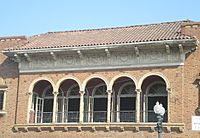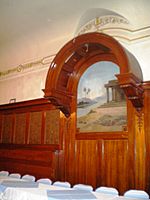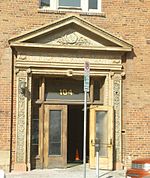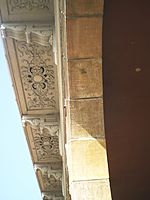Highland Park Masonic Temple facts for kids
The Highland Park Masonic Temple is a historic brick building in the Highland Park area of Los Angeles, California. It's also known as The Mason Building or The Highlands. This three-story building stands on Figueroa Street and has a long history.
Contents
History of the Building
This building was finished in 1923. For 60 years, it was used by a group called the Free and Accepted Masons as their meeting place, Lodge 382. The building originally had shops on the first floor. The Masons' meeting room and a large hall were on the second floor.
In 1983, the Masons had to leave the building. They couldn't afford to make the building safe enough for earthquakes. Private developers bought the building. They turned the second floor into a big hall for events. The original meeting room, called the Lodge Room, was saved and fixed up. It still has its beautiful wood walls and special wallpaper. Today, this room is a popular music venue.
Building Design and How It Was Built
The building was designed by Elmore Robinson Jeffrey. He used a style called Renaissance Revival, with some parts looking like Mediterranean Revival. Jeffrey was a Mason himself and gave the building plans to his Lodge. He was even in charge of the Lodge in 1928. This building style was very popular in Los Angeles in the 1920s.
The Highland Park Masonic Temple is about 25,000-square-foot (2,300 m2) big. It was built between 1922 and 1923 and opened in July 1923. The Masons used the second and third floors. The first floor had shops, which helped the Lodge earn money.
The most impressive room is the Lodge Room on the second floor. It has an 18-foot (5.5 m) high ceiling. The walls are covered in rich cherry wood and special embossed wallpaper called anaglypta. There are also paintings of Egyptian scenes, like a sphinx and pyramid.
Outside, you can see a beautiful frieze (a decorative band) with Masonic symbols along the roofline. The front of the building on Figueroa Street is also very impressive. It has columns and a balcony.
How the Building Was Used
Masonic Lodge 382 Activities
The Masons used this building for 60 years, from 1923 to 1983. Another Masonic Lodge, Garvanza Lodge No. 492, also met there. Several youth groups connected to the Masons also used the building. These included Job's Daughters International, International Order of the Rainbow for Girls, and Order of DeMolay for teenage boys.
In 1983, the building needed expensive updates to make it safe for earthquakes. The Masons couldn't pay for these repairs, so they had to move out and sell the building. The different Masonic groups found new places to meet.
New Life as an Event Space
In 1983, Allen Golden and his partners bought the building. They spent many years, from 1985 to 1989, fixing it up. They made it safe for earthquakes and restored many of its original features. They even put back awnings that were part of the first design. They also uncovered beautiful leaded glass windows. They were careful to save old details like doorknobs with Masonic symbols, the cherry wood walls, and the special wallpaper.
The newly renovated building opened in January 1990. The second floor became a place for community events and parties. The Lodge Room was kept almost exactly as it was in 1923. The old light fixtures were replaced with antique ones to match the building's history. The Banquet Hall, a large room with wood floors, is now used for many different events. People can rent these two large rooms for weddings, anniversaries, quinceañeras, and other celebrations.
The third floor was turned into office space. To make room for these offices, a balcony that looked over the Lodge Room had to be removed. This was one of the few changes made during the restoration.
The Lodge Room and Checker Hall Today
As of 2018, the building is used as a live music venue. It also has a bar and a restaurant.
Important Historic Status
The Highland Park Masonic Temple is recognized as a very important building. It was named a Los Angeles Historic-Cultural Monument in 1984. It was also added to the National Register of Historic Places in 1990. This means it's officially recognized for its historical and architectural importance.
Gallery of photos


